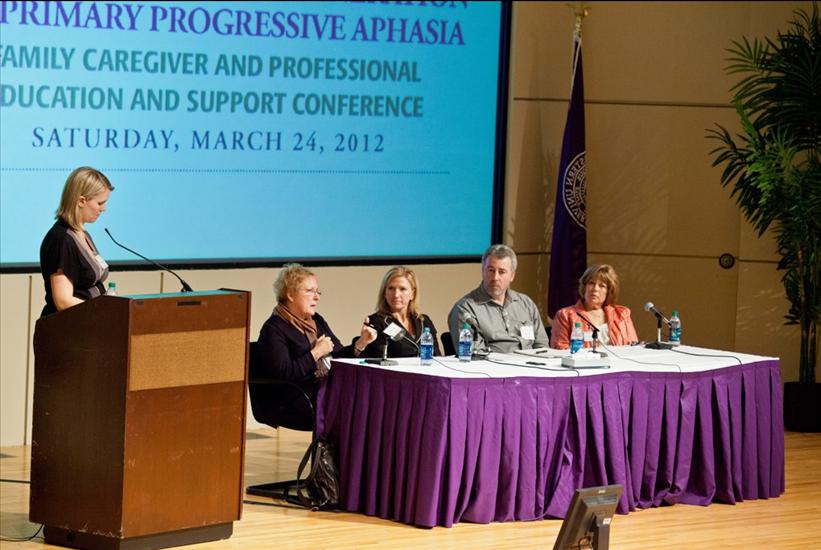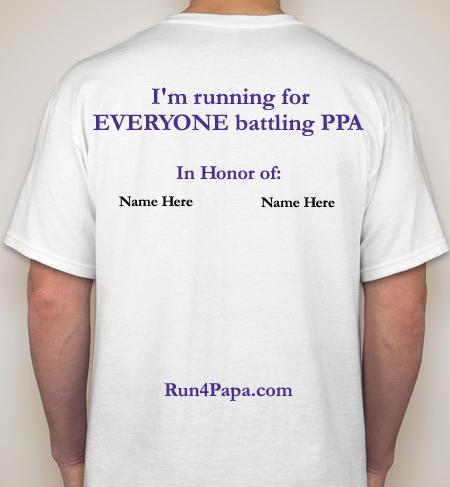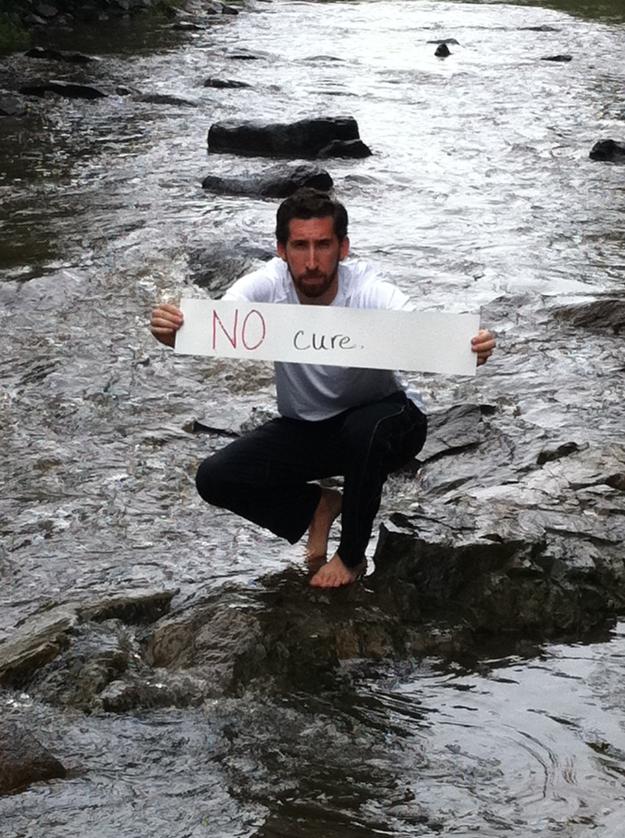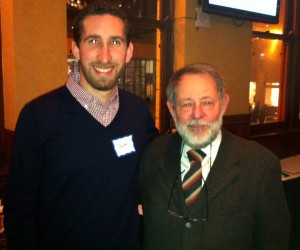2012 Northwestern CNADC PPA Conference
One Voice: Caring for EVERYONE with PPA
The 2012 CNADC PPA Caregiver Conference was an important day for those of us with loved one’s battling PPA. We had the sharpest minds in the field educating us on how to help those we love the most. As the morning kicked off, my vending booth was prominently located and positioned side-by-side CNADC’s to help promote the Run4Papa campaign. My booth had 3 main exhibits: 1. A personal letter of endorsement from Dr. Marsel Mesulam 2. A computer with Run4Papa.com pulled up for attendees to view and learn more about THE CAUSE 3. The newly launched Running Shirt – an opportunity for EVERYONE battling PPA to have their loved one’s name on the back of my shirt for the Great Wall of China Marathon – a BIG HIT!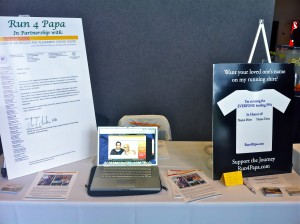
The conference exposure was heart-warming because I had the pleasure of meeting caregivers whose loved one’s were diagnosed with PPA. While there were plenty of new names and faces, there were plenty of people attending that were following THE CAUSE online through social media like Facebook and Twitter. On top of all that, the most emotional conversations (if I am allowed to be biased) took place when speaking with patients battling PPA, all of whom were enthusiastically encouraging the efforts of the Run4Papa campaign.
With 324 attendees, the conference was tailored to family caregivers as well as health care professionals. Dr. Marsel Mesulam, Director of the CNADC and the man who first identified PPA, graciously welcomed everyone to the conference. Following his introduction, a lecture on the state of PPA research and treatment by Northwestern physician and assistant professor of geriatrics was delivered by Dr. Diana Kerwin. Our keynote address on “Behaviors, Language and Communication” was presented by Dr. Geri Hall (from Banner Alzheimer’s Institute in Phoenix), who has lectured and published widely on behavioral interventions and communication strategies in dementia, specifically PPA. The morning session ended with an interactive Q & A session from a panel of doctors and PPA caregivers. This opportunity provided audience members the ability to ask questions ranging from medical opinions, to family member reactions about PPA as well as expectations down the line for caregivers. When all the questions had been asked and answered, we broke for lunch and gave attendees more time to mingle amongst the vendors at the conference.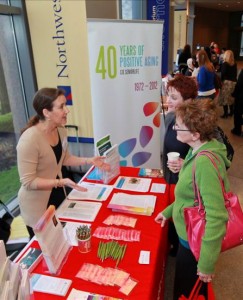
During the afternoon, the CNADC team organized 12 different breakout sessions for members to attend. Here were some of the choices:
a) Newly Diagnosed, Now What? b) Understanding Genetics in PPA c) Responding to Behavior and Personality Changes in PPA d) When is it Time? Identifying Options and Making Transitions for Care.
My parents split the meetings above while I attended the Support for Family Caregivers and Exploring Creative Art Therapies sessions. The caregiver session was unbelievably emotional because everyone shared their unique personal story. In the same respect, it was extremely helpful listening to everyone and learning how each person/family copes and adjusts to an ever-changing lifestyle of caregiving. Even though this was my first caregiver group experience, I could see the instant impact our dialogue was having on the faces around the table. One caregiver whose wife was diagnosed with PPA within the past couple years said, “I didn’t think I needed to come here before, because to be frank, I was in denial about my wife. This year, I realized that was a mistake. I will continue to come every year moving forward and attend the support groups for help and advice in the future.”
Similarly, the creative art therapy session was equally informative yet surprisingly entertaining. Through hands-on classroom activities, we learned how art, music and movement therapy help people diagnosed with PPA by maintaining their sensory and motor skills. The behaviors included expressing our inner thoughts by drawing pictures on paper, using hand gestures to communicate our emotions, and singing along to improvised songs instructing us to repeat specific lyrics.
As the breakout sessions finished, everyone headed back to the lecture hall for the conclusion of the conference. My What would you do for THE CAUSE? video was being shown and looped for roughly 15 mins on the big screen as everyone took their seats. Dr. Jennifer Medina concluded the day with her speech on “Stress and Caregiving: Mindfulness as a Coping Tool.”
I was so proud to share this day with my parents, family caregivers, patients, experts in the field-and of course-the CNADC team. The conference is an excellent resource for families and people fighting against PPA who want to be a part of a special team dedicated to finding treatment and a cure for this brutal disease.
If you couldn’t make it this year for whatever the reasons, please don’t miss it 364 days from now.
In Honor of
Want your loved one’s name on my running shirt?
Here is your chance to make a contribution and have your loved one’s name placed on the back of my running shirt in honor of their battle against PPA during the Great Wall of China Marathon in 2012.
For special dedication, go to: PPA Research and Education Fund – Run4papa
- Please reference “Running Shirt Campaign” in comments section – bottom of page 2 on donation site.
Thank you for your support!
National PPA Conference
An Average Person Doing Extraordinary Things
2012 Annual PPA Conference – Saturday, March 24th
Thorne Auditorium, Rubloff Building
375 E. Chicago Avenue, Chicago, IL 60611
Come out this weekend and help Support the Journey to raise awareness for all those battling PPA everyday!
Click on Event Itinerary
Jason Boschan has partnered with the CNADC to raise funds in support of primary progressive aphasia (PPA) research. Jason’s grandfather, Dr. Louis “Papa” Heyman, a pediatrician for 50+ years, was diagnosed with PPA, a dementia that makes a person progressively lose the ability to communicate and comprehend language, in 2009.
Jason is running the Great Wall of China Marathon in May 2012 to honor his grandfather and EVERYONE battling PPA. The marathon is very exclusive and includes steep inclines that total over 5,000 steps. It is the equivalent of running up and down the Hancock Building & Willis Tower, and then taking a round trip between the Chicago and Evanston campuses of Northwestern University.
Jason has trained and run races in 9 states to prepare for the Great Wall of China Marathon. This campaign has helped bring awareness to PPA research and there have been over 360 individuals who have donated to the cause.
Nothing Political About This
Next Stop…Washington, D.C.
2012 Rock ‘n Roll Half/Marathon
Despite being a not-so-closet political junkie/semi-obsessed debate addict/campaign speechwriter wannabe (for a couple months at least), I am leaving all-things political related back in Charlotte. I promise. Not one repetitive campaign slogan, no one-liners, and absolutely no cheesy overused talking points. Not one. This weekend is all about one thing, er, maybe two or even three…but the one thing we know for sure is running is definitely one of them!
Rock Our Nation’s Capitol will mark the completion of my 3rd half marathon this calendar year in preparation for the Great Wall of China Marathon this May. I am very excited to be participating in my first ever Rock ‘N Roll event and even prouder to be sharing this experience with my good friend Adam, who will be running and finishing his 1st FULL marathon as a precursor to China.
I am pumped to be heading back to Washington D.C. I have an affinity for this scenic city, the historical national monuments, and hopefully a sneak peak at the famous cherry blossoms – the nation’s greatest springtime celebration commemorating their 100th year of the gift of trees. No doubt the atmosphere will be infectious! My bag is packed and I am ready to go…
I don’t even need to catch the end of this political commentary, and in case you are wondering, it is not being DVR’d. At least, not to the best of my knowledge.
This non-political message is approved by the Run4Papa Campaign.
Dr. Marsel Mesulam endorsement
Dr. Marsel Mesulam who first identified PPA supports Run4Papa
Dr. Marsel Mesulam, Director of the Cognitive Neurology and Alzheimer’s Disease Center at Northwestern University proudly lends his support to the Run4Papa campaign.
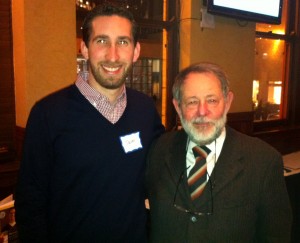
Run4Papa v. Hustle up the Hancock Race
94 Flights? No problem!
94 flights. 1,632 steps. 4,000 competitors. Run4Papa prepares for the 5,164 steps on the Great Wall of China Marathon by Hustling up the Hancock for THE CAUSE.
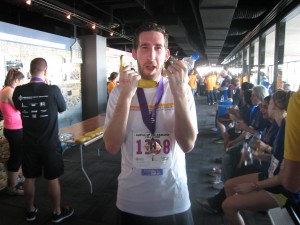
To see photos, go to: Hustle up the Hancock
2012 Northwestern CNADC Fundraiser
A Night of Awareness in the Windy City
Leaving 70 degree weather behind in Charlotte, North Carolina and heading up north to the Windy City of 25 degrees, blistering winds and snow may not sound ideal on paper; however, when such a tremendous group of people come together for a great cause like this one, it’s a no brainer!
The goal? To get a bunch of local Chicago-ans and friends together in one room to support THE CAUSE by raising awareness and funds for the Cognitive Neurology and Alzheimer’s Disease Center (CNADC), the #1 research facility in the world for PPA research. Thanks to Kevin Connolly and his wonderful team at CNADC, we brought in over 100+ guests for this event. Friends came in the cold to support this journey and our host, Rock Bottom Brewery, did a fantastic job of keeping people’s glasses and bellies full the entire evening.
Not only did this fundraiser bring a hefty amount of money, but we had a multitude of activities taking place throughout including a PPA video (made in my hometown of Charlotte), a silent auction and a raffle featuring prizes local Chicago-ans took full advantage of.
We had the distinct honor of meeting Dr. Marsel Mesulam, the doctor who first identified PPA and Director of the CNADC medical department along with his wife Dr. Sandra Weintraub, a renowned doctor with a PhD in NeuroPsychology . We had the pleasure of meeting patients who had been diagnosed with PPA who were proud of the work being down with this campaign along with their inspirational family members fighting everyday for more awareness and treatment for THE CAUSE. We had friends and family that lived in Chicago show-up as well as people whom have been following this cause from Day 1. I was thrilled to finally meet them in person! On top of that, there were several people who ran The Great Wall of China Half and Full Marathon in attendance. You better believe I was picking their brains for stories, advice and feedback about the run ahead!
Through the diligent work of the CNADC team, 6 amazing packages were assembled for the silent auction. Moreover, a raffle was held at the end of the evening giving away prizes from local Chicago vendors and sponsors.
Lori Gapinski, one of many people attending the event remarked, “Had a wonderful time tonight at the fundraiser. Such good people and all our best to Jason. Thank you for all that you are doing! Good Luck on Sunday and May 19th! We all will be thinking of you as you are doing such a wonderful thing for the people that are suffering with PPA and the loved ones surrounding them.”
You never know how an event is going to come together when you start from scratch, but I think it is fair to say, we were blown away by the turnout and support last night. Without a doubt, the CNADC fundraiser delivered BIG-TIME!
With the fundraiser being a massive success across the board, we can now focus on the race ahead – Hustling up the Hancock building against 4,000 other competitors.
94 Flights. 1,632 steps await. Wouldn’t have it any other way!
To see more photos, go to: Hustle up the Hancock
To watch the speeches, go to: CNADC and Run4Papa Speeches

